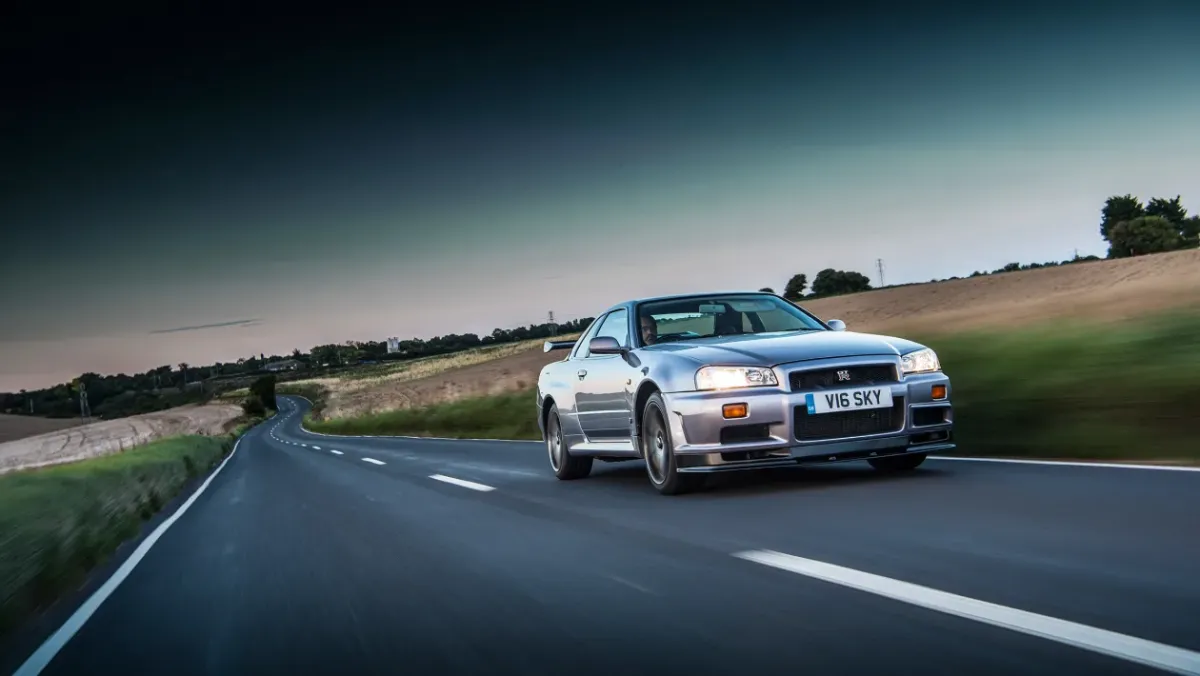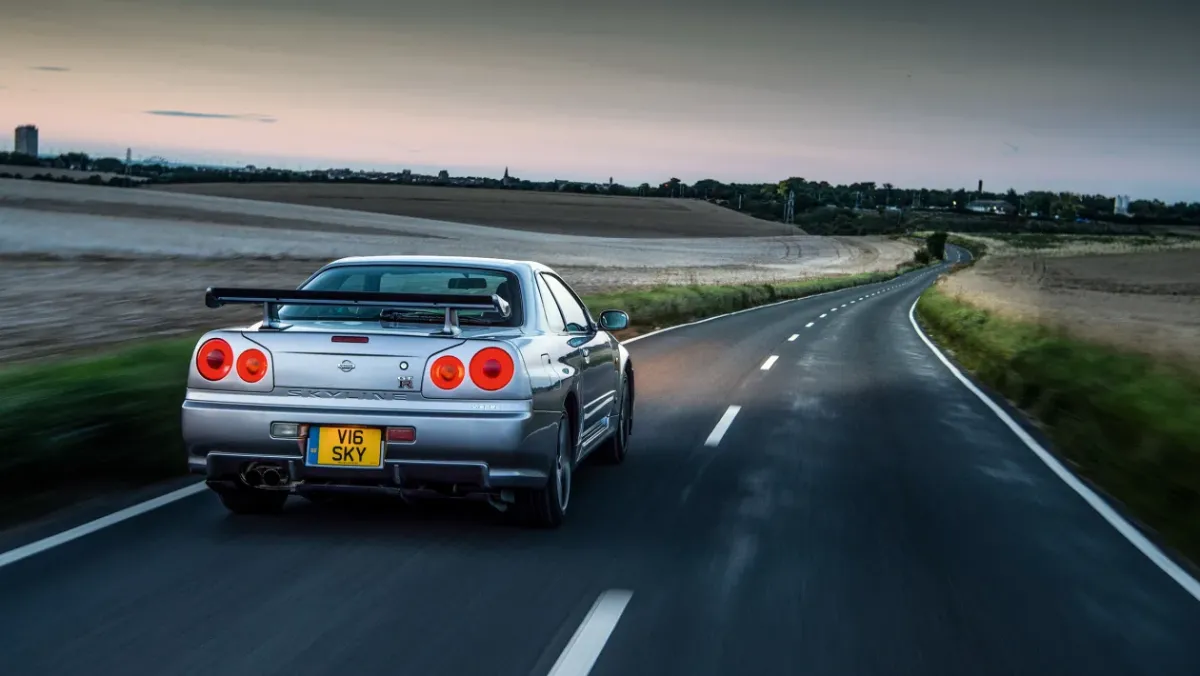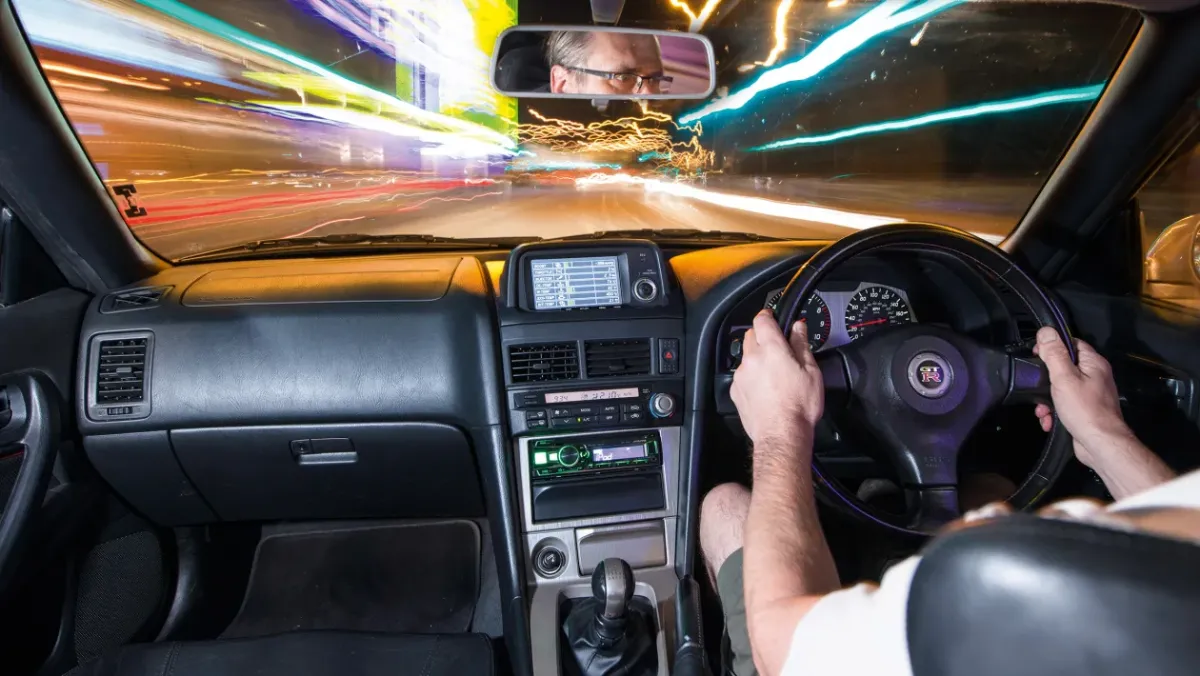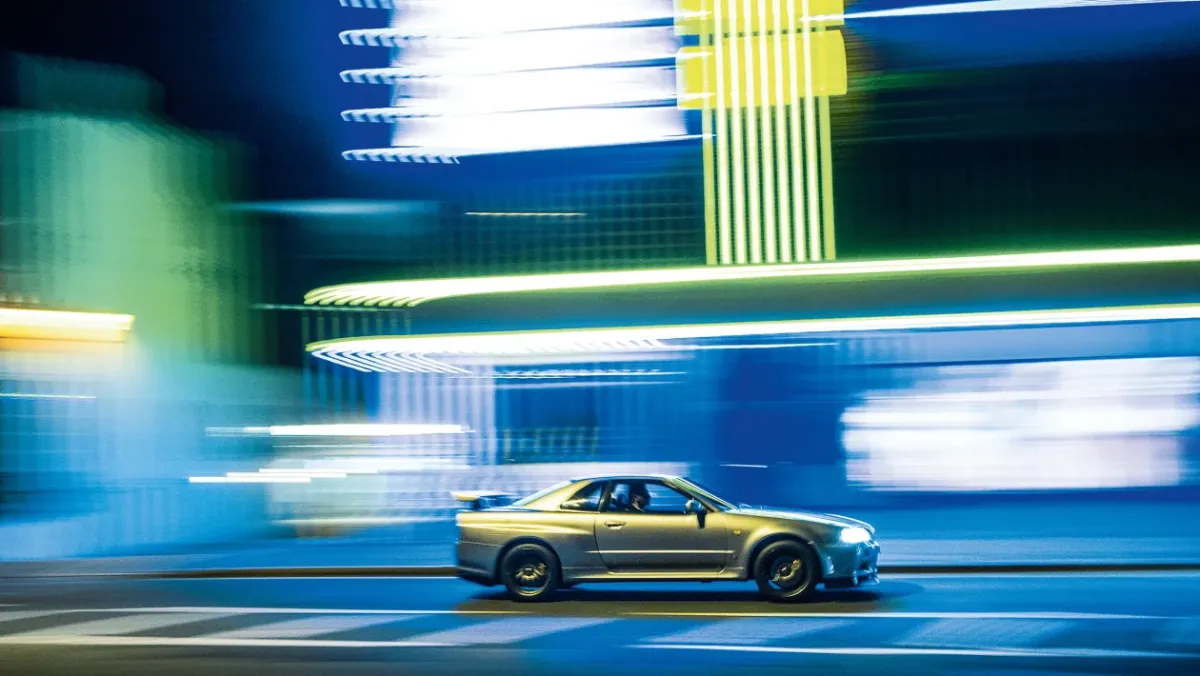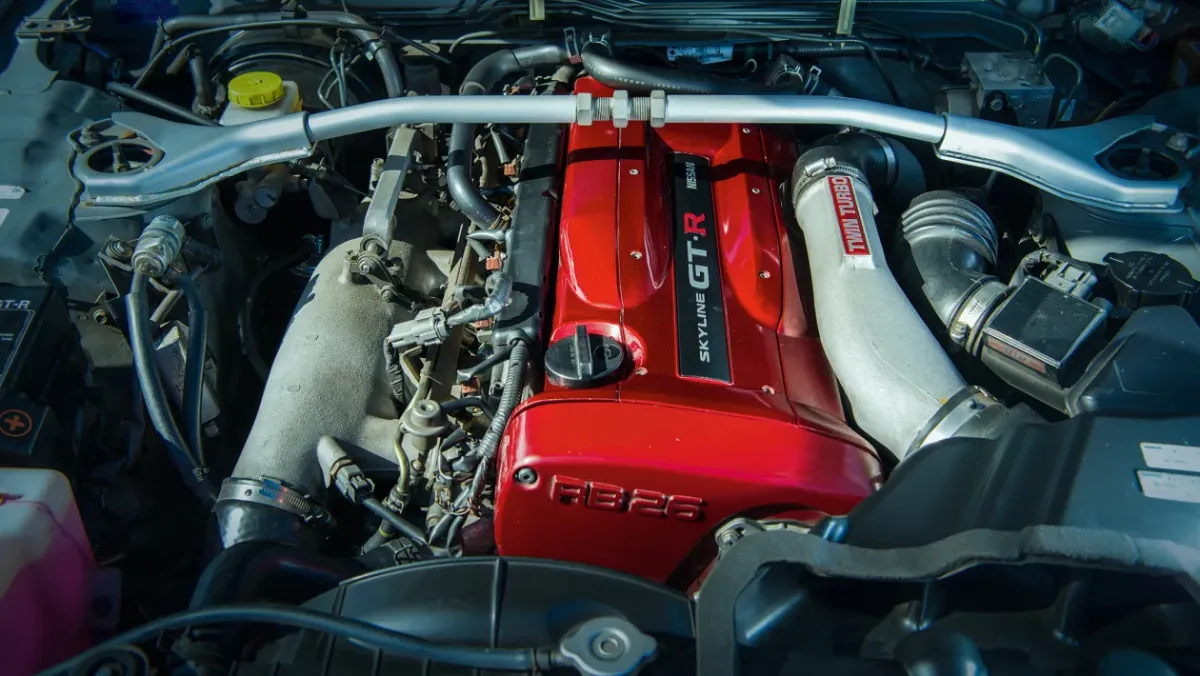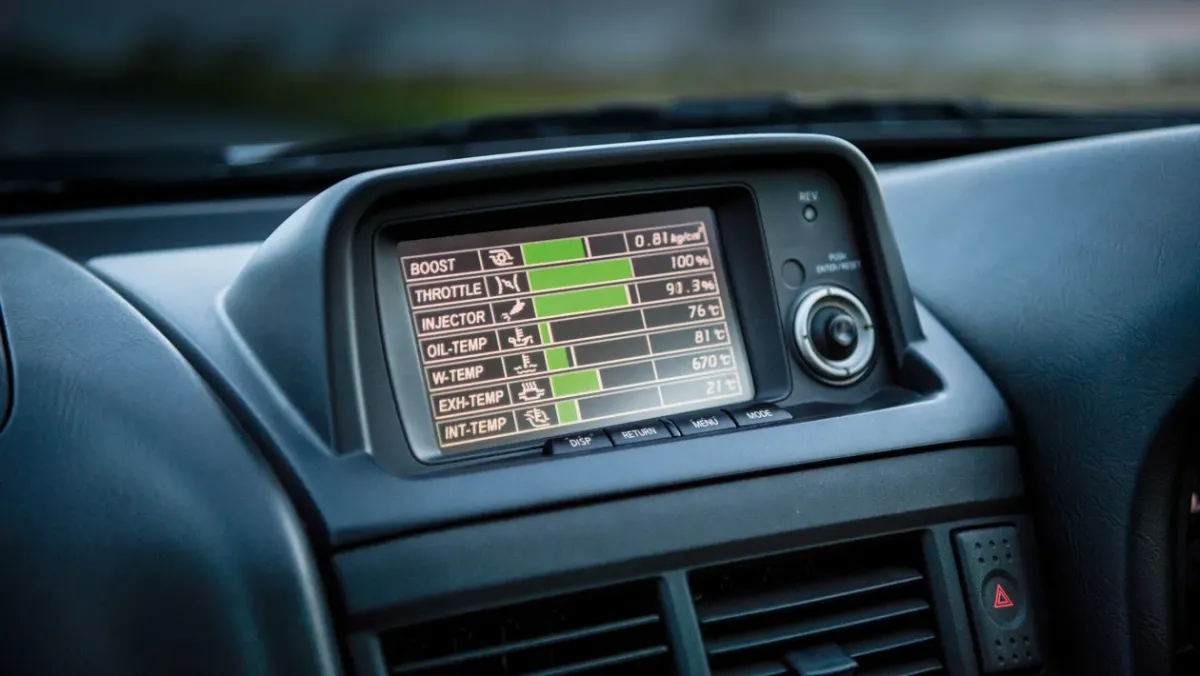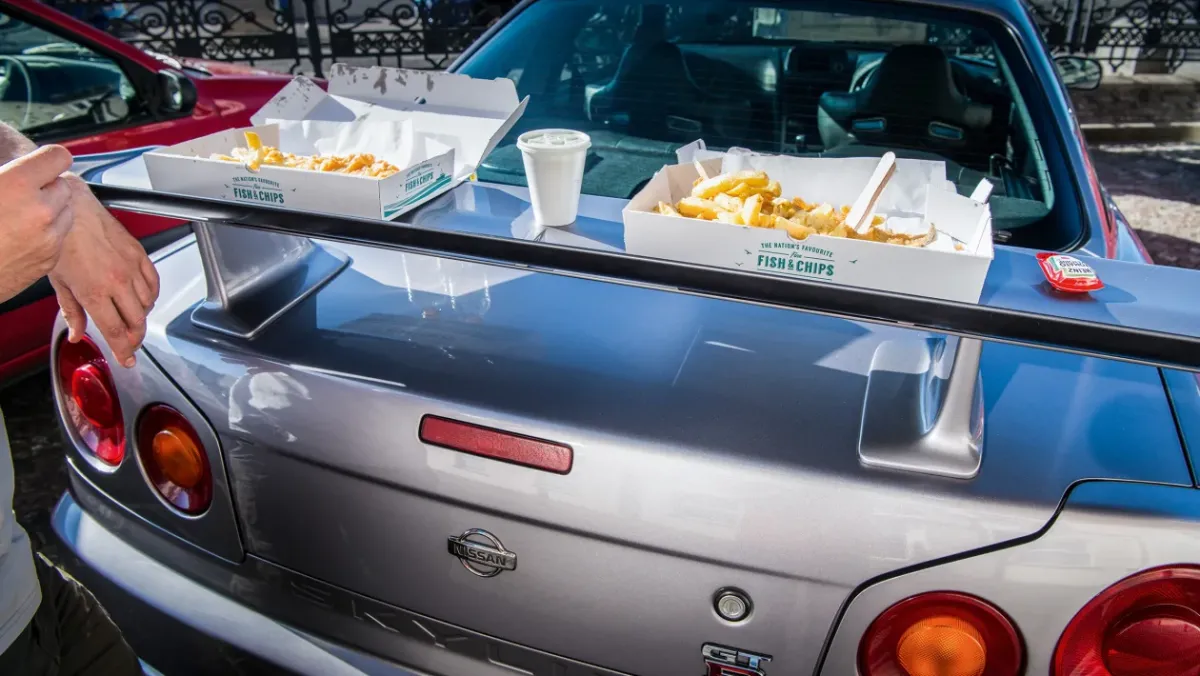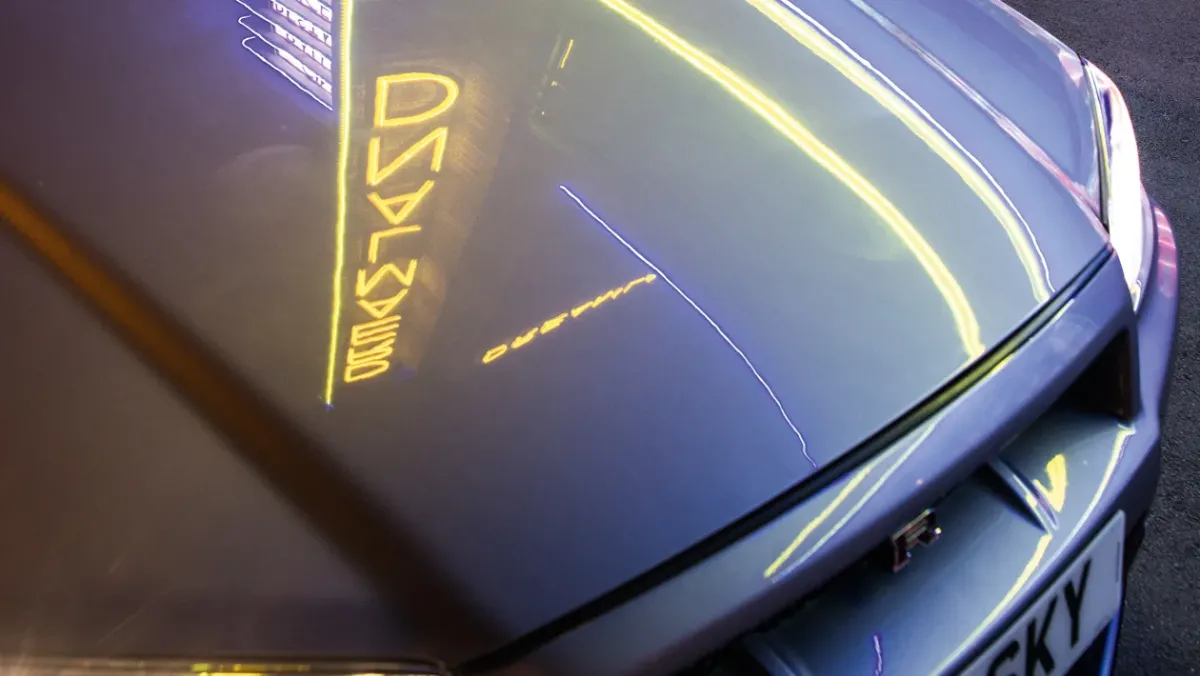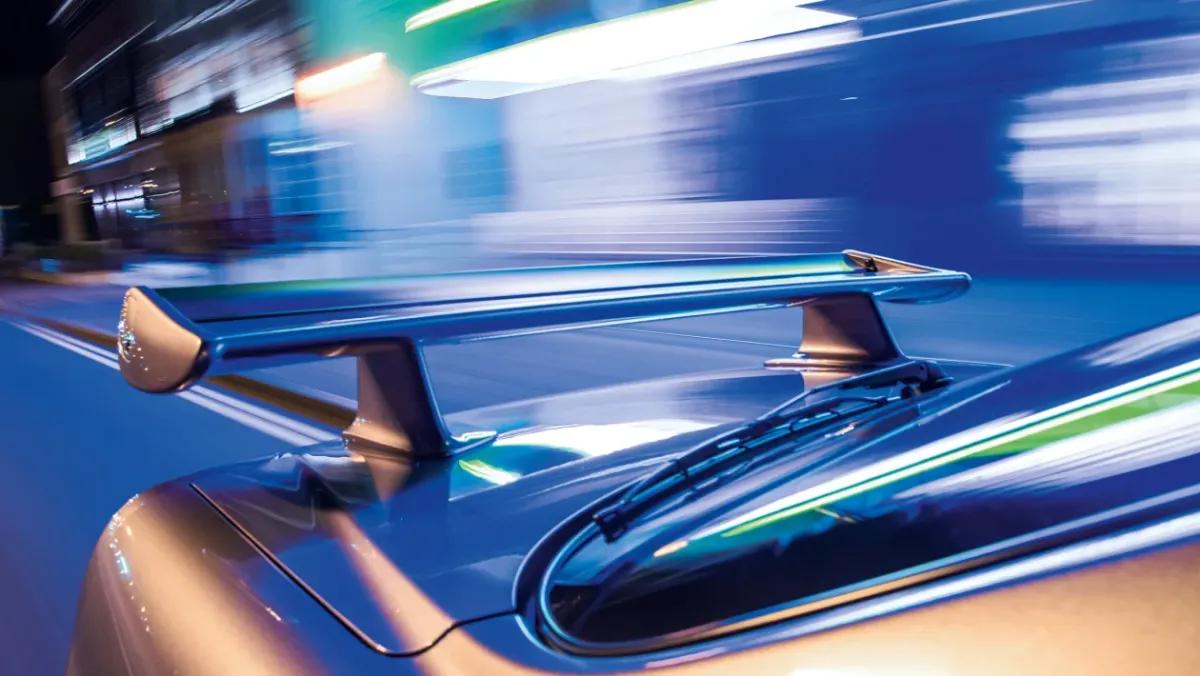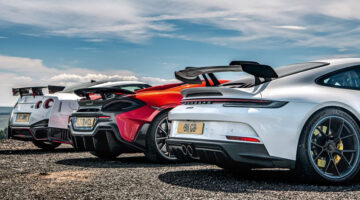The last of the original Skylines there is no disputing the R34 GT-R’s icon status.
Trundling gently up and down this road for car-to-car shots, we’ve held up a couple of cars, and the old Ford Ka has been delayed a bit longer than most. So when it slows to a halt as we’re turning around for another run, I’m braced for a scowl or maybe a hand gesture. I look across and the lady in her 50s is gesticulating alright. But she’s giving the double thumbs up and smiling madly. Before pulling away she shakes her head like she just can’t believe she’s seeing an R34 Nissan Skyline GT-R, blows a few kisses, and is gone.
I’ve been fortunate enough to drive some great cars in great locations and I’ve never experienced such universally positive reactions as greeted the R34 when we turned up in Margate. There’s probably no more subtle a colour than silver and has the standard twin-pipe back-box rather than the optional Nismo drainpipe, so it’s quieter than a 370Z, but as we amble along the seafront on this busy, sunny afternoon, I’m getting a taste of what it must be like to be a celebrity. At one end of the scale there’s nudging and pointing, double-takes and ‘subtle’ raising of cameraphones, and at the other plain awe, reverence and wild enthusiasm, occasionally with sweary, can-you-believe-this?! shouting. And it’s all sorts of people too, from kids to pensioners, parents to youfs. No question, driving an R34 gets you a whole lotta love.
Back in the spring of 1999 when I first drove one, the R34 was a stranger in the region. It was an import – quite possibly the first – loaned to us by Simon Lerner of Intercar (still sourcing specialist Japanese cars today). I don’t recall it being spotted by anybody on our whistle-stop 24-hour trip from London to north Wales and back. It was a huge step on from the chubbier-looking R33 and more aligned visually with the delectable R32, the first Skyline GT-R to make it here, in tiny numbers via grey importers such as Intercar and Rare Imports.
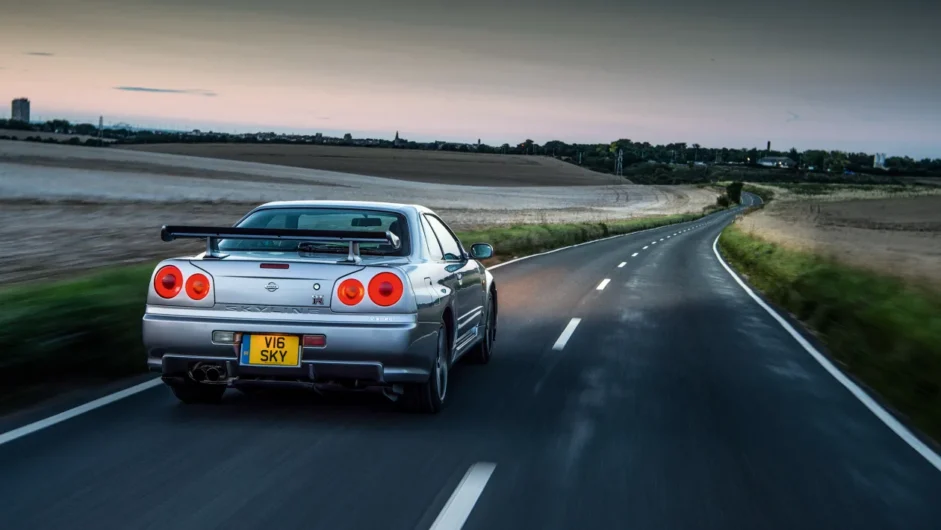
Skyline specialist Middlehurst Motorsport had brought in 100 R33s and when the R34 came along Nissan GB wanted to bring the car officially into the region itself. There would be a delay, though, because although the all-wheel drive running gear was lightly stressed by the stock ‘276bhp’, it wanted to add a package of upgrades to protect the car in the event of sustained autobahn running – oil coolers for the engine, gearbox and AWD transfer box. There was a new engine ECU too and, completing the mods, the interior was enhanced with Connolly leather-trimmed seats.
This slightly odd mash-up of Japanese high tech and traditional British craftsmanship lies partly in the passion of the Connolly brothers for the Skyline. They had been fans since the R32 and were friends with the owner of Rare Imports, who was able to source cars for them.
Middlehurst Motorsport carried out the work required to make the R34 ‘Euro-proof’ and some 80 V-spec, this being one of them. It was later acquired for the Nissan heritage press fleet and is completely standard. It took some finding, apparently, which is hardly surprising as unmodified R34s must be as rare as unclaimed lottery tickets. Anyone oblivious to the untapped potential of the legendary 2.6-litre twin-turbo straight-six would have been put right by a certain movie franchise that kicked off a year or two later, the frankly absurd Fast and Furious series that helped grow the cult of the GT-R to global proportions.
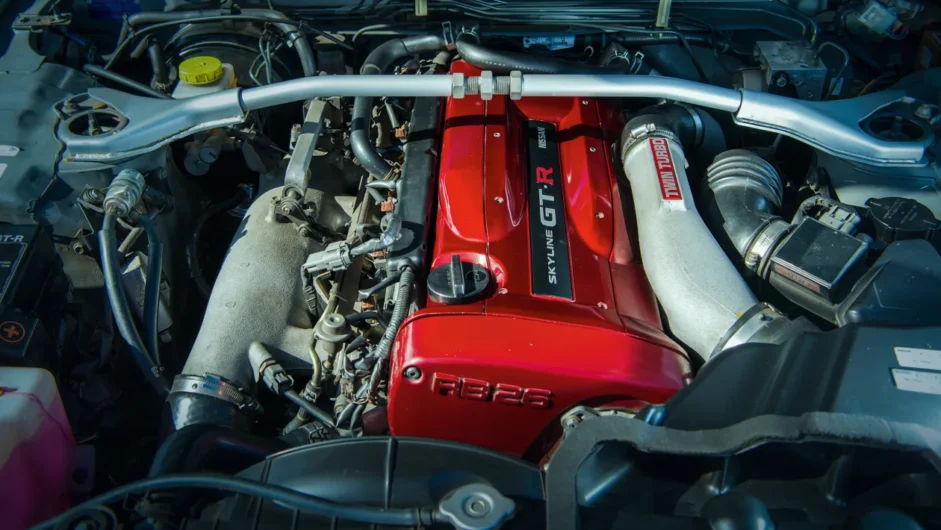
This unmodified car has less power than my SEAT Cupra long-termer, and as you might expect from its square-jawed, Minecraft-like looks, it’s hefty too, getting on for 1600kg. I have always been sceptical that the R34 had only 276bhp as standard, which was a ceiling agreed between car makers in Japan at the time. It had a bit more torque than the R33, and ceramic turbos running ball-race bearings that gave snappier throttle response, but even so, it always felt a bit more like 300-plus. Fast-forward to the launch of the R35 and many commentators reckoned that had more than the quoted 473bhp. Maybe Nissan’s horses are a little bigger or its kilograms a bit lighter…
What Nissan and the many tuners knew was that this was the ground floor. A simple ECU remap – the equivalent of pulling a bung out of the exhaust – could lift this to around 350bhp, and the potential of the RB26DETT engine was good for up to three times that, which is incredible. The rest of the car could take a great deal more power and torque too, so as a consequence the chassis appeared rather over-specced – ATTESA four-wheel drive, Super HICAS four-wheel steering and handsome 18-inch wheels that we described as ‘massive’ back in the day but which look modest now with their hot hatch-sized 245/40 R18 Dunlops.
It’s old school in so many ways. The key comes with a connector on the fob that you have to touch against a receptor on the dashboard to disarm the immobiliser, and the Alpine head unit is unfathomable at a glance. But what’s retro in a good way is that iconic, competition-hardened straight-six under the long bonnet. Here’s an engine with character in both sound and delivery.
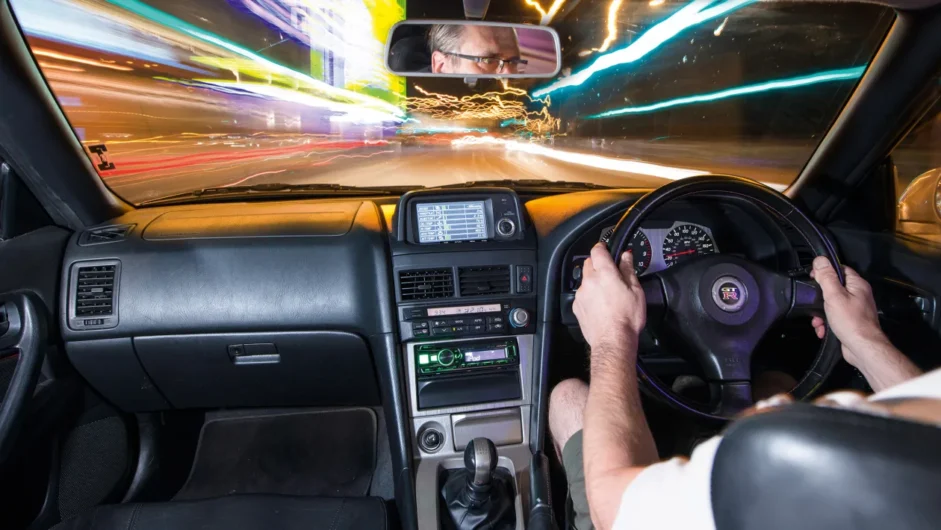
It’s not like other turbo units, lacking the immediate, small-throttle response of today’s light-pressure turbo engines but also not being like early turbos, with their eye-widening, blue- touch-paper delivery, though I’m minded this may be an effect of it being in a low state of tune. Toting little more than 100bhp per litre, this Skyline’s delivery builds more like a naturally aspirated engine, with not much up to 3000rpm and growing enthusiasm thereafter. You can hear and feel the boost arriving, the loping, gravelly growl of the straight-six swamped by the hiss of air being ingested, compressed and fed into the engine. As the revs march ever- more confidently upwards, the engine finds its voice again and its delivery grows and expands its impact until you’re at 6000rpm and the car’s surging determinedly forward.
Oddly, it doesn’t seem to matter what gear you’re in. This gathering-momentum delivery feels as strong in fourth and fifth as it does in second and third. The speed just keeps piling on, the engine firing the R34 at the horizon with ever-greater purpose. Just the 276bhp? Still feels more. The stability is awe-inspiring, too, the Skyline tracking straight and true, spearing down the road with a solid, unwavering purpose that cements your confidence. It feels built for Germany’s autobahns, so Nissan GB was smart to uprate the cooling of the drivetrain’s vitals.
The temperature of the transfer case oil is one of the few ‘vitals’ you can’t monitor via the dash-top MFD (Multi Function Display), whose mini-tablet styling is remarkably modern- looking. Mind you, the screen resolution isn’t all that great, and rather than offering nav and connectivity, the display allows you to monitor the status of many obscure items, most of which you’d think would only be of interest to a tuner – injector delivery, exhaust and intake manifold air temperature, that sort of thing…
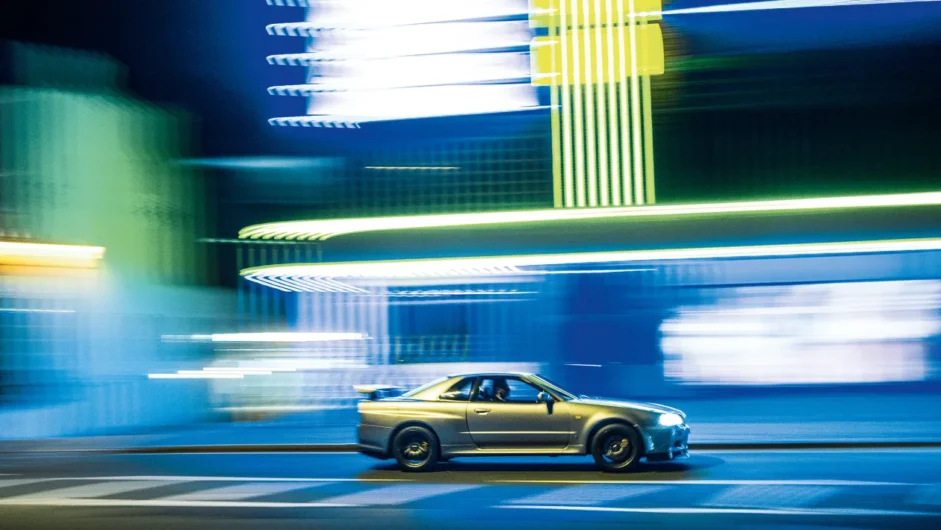
For me, what cements the R34’s claim to be a drivers’ car is that the weighting and feel of all the major controls – the gearshift, pedals and steering – are in harmony. The shift of the six- speed Getrag gearbox is particularly delicious, moving with a weighty, solid but slick action around a well-defined gate, as if below the lever there are precision-machined, well-oiled blocks of steel sliding over each other. Heel-and-toe is easy thanks to an ideal brake bite point and pedal spacing, so it responds well to finessing, but there’s an underlying strength revealed when you rush the shift, a sense of durability that is no illusion, because the whole drivetrain is rated for much higher torque.
Another indication that the car was crafted by people who love driving is the steering wheel. It’s just the perfect diameter, its rim is the ideal width and shape and there are no buttons on it. True, the steering isn’t the sharpest but I find the chassis of the R34 more transparent, more readable than that of the current R35. Essentially, it’s rear-biased, though in the dry, up to the high limits (elevated by the modern Dunlops fitted), it feels like it has an excess of grip, delivered by a chassis that has a sweet, biddable overall balance. The fact that you can’t feel the rear steering counter-steer on the way into a corner (aiding turn-in) and quickly switch to parallel steer (to restore stability) is a big compliment to the engineers.
Then there’s the all-wheel-drive grip. Nail it out of a roundabout and there’s a bit of squat and absolute traction. Previous experience shows that on low-grip surfaces it becomes distinctly rear-drive, in a friendly way. The V-spec car gets an active rear diff and only when this can’t find enough grip at the rear tyres to deploy the torque does drive head to the front. The progressive ramp-up of torque allows the slip to be accurately managed and drive to the front wheels keeps things moving forward and helps to pull the car straight.
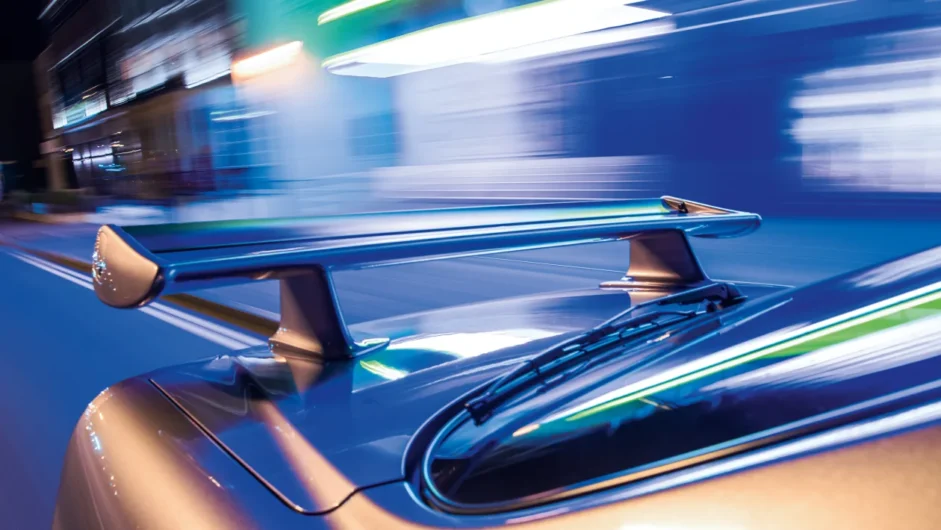
The V-spec is firmer than the standard set- up and back in the day seemed a bit too tough for local roads. But, in the same way that the uncompromising ride of the 964 RS seems to have softened over the years (it hasn’t, really, it’s just the context of modern cars), so the V-spec R34 feels firm but not rough, detailed but not jittery. It has a no-nonsense way of dealing with bumps that aids confidence; in the same way that the boost seems to build with speed, so does the firmness and control of the ride. It’s great to be back in the hot seat. I’m genuinely impressed by how this near-20-year-old hangs together as a drivers’ car.
At 9pm we rumble the R34 down to the end of the deserted harbour wall to get the shot looking back at Margate in all its night-time glory. Disappointingly, the main lights we were hoping to see – the yellow and blue of the Dreamland amusement park – aren’t yet lit up. It also turns out the wall is not deserted: there’s a little gathering of lads drinking cans of strong lager. They get very animated when the Skyline appears, delivering a barrage of questions: ‘Is it yours, mate?’, ‘How fast have you been in it?’, ‘Can I sit in it?’. It’s all very good humoured and respectful. The ones who know exactly what they’re looking at explain to the others that they’re in the presence of an icon. And the best question?
‘Why the f*** did you come to Margate?!’ Aston shows them the back of his camera and they are amazed. Why did we come to Margate? Mainly for the brightly lit arcades, for the old-school vibe. This traditional British seaside resort is mid-transformation, the catalyst for which has in part been the opening of the Turner Contemporary art gallery. So it’s a place of contrasts, with new, cool, gentrified bits sitting cheek by jowl with kiss-me-quick brashness. You can see it in the people, too: they’re half hip, half hip replacement. In a couple of years or so, it will be a much more modern, more sophisticated place, and more expensive too. Not unlike the R35 GT-R is compared with the R34. But that doesn’t mean the simple pleasures are any less relevant.
Rivals
The R34 Skyline GT-R was introduced at the tail-end of a prosperous financial period in Japan that gave us a cross section of high performance cars from most Japanese manufacturers. At its introduction in 1999, the GT-R had rivals in the Toyota Supra, Honda NSX, Mazda RX-7 and even a couple of odd-ball offerings from Subaru (SVX) and Mitsubishi (3000GT). Yet it the Asian financial crisis that followed ensured that none of these rivals were given a proper sequel, making the R34 quite a lot newer than its key rivals.
In Europe, Nissan’s conservative 276bhp power cap might have looked meek compared to European sports cars like the Porsche 911 Turbo or Ferrari 360 Modena, but the reality on the road was quite stark, cementing its giant-killer status – even if its official European sales were comparatively tiny.
Nissan Skyline GT-R V-spec (R34) Specs
| Engine | In-line 6-cyl, twin-turbo |
| Power | 276bhp @ 7000rpm |
| Torque | 289lb ft @ 4400rpm |
| Transmission | Six-speed manual, four-wheel drive, active rear rear LSD |
| Front suspension | Multi-link, coil springs, passive dampers, anti-roll bar |
| Rear suspension | Multi-link, coil springs, passive dampers, anti-roll bar |
| Brakes | Ventilated discs front and rear |
| Wheels | 9 x 18in front and rear |
| Tyres | 245/45 ZR18 front and rear |
| Weight | 1560kg |
| Power-to-weight | 180bhp/ton |
| 0-100kph | 4.8sec (claimed) |
| Top speed | 265kph (claimed) |
| Price when new | $60,000 (1999) |
This article originally appeared at evo.co.uk
Copyright © evo UK, Autovia Publishing

